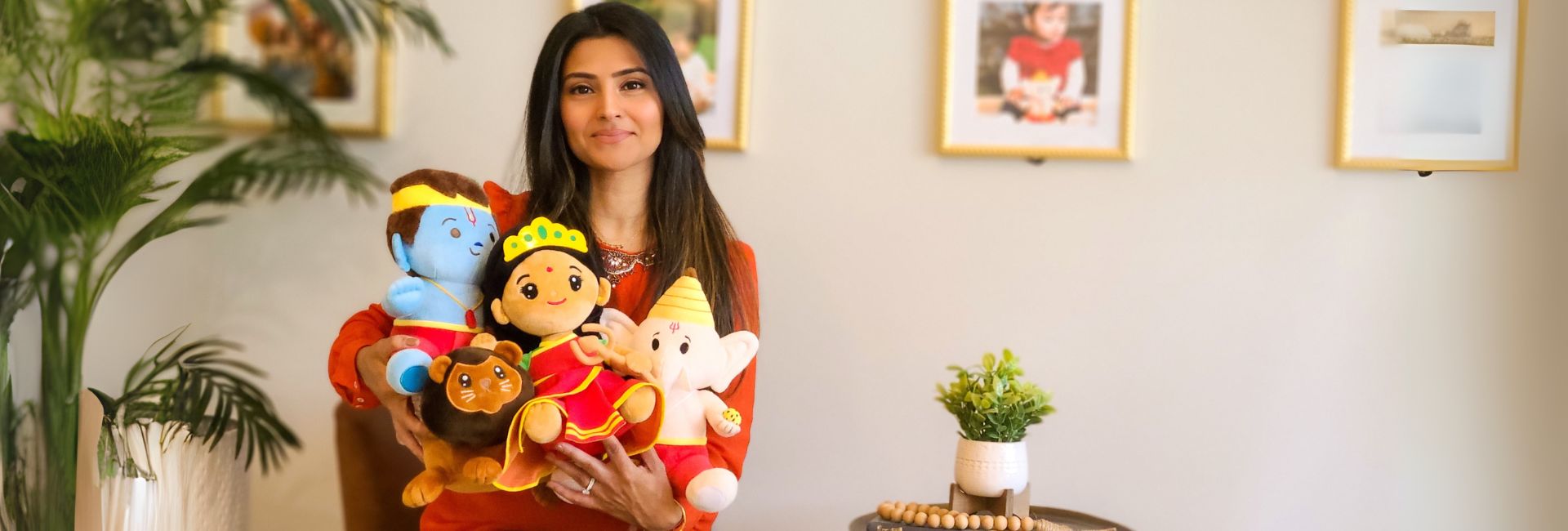(May 17, 2025) It all started with a simple, almost innocent quest – a father-to-be looking for a special toy for his unborn daughter. He didn’t want just another teddy bear or musical mobile. He was searching for something that reflected his roots, something that could connect his child to the culture he grew up with. But no matter where he looked, he came up empty. That moment sparked an idea. For siblings Avani Modi Sarkar and Viral Modi, who grew up in the US as first-generation Indian-Americans, it raised a powerful question: how do we teach our kids about our Indian heritage in a way that feels natural and fun? That’s how Modi Toys was born — a brand that brings Indian culture to life through plush toys, stories, and music. “This wasn’t just our problem – it represented a challenge faced by hundreds of millions in the Indian diaspora,” Avani tells Global Indian.
What began as a personal mission soon became something much bigger: a way for Indian families around the world to stay connected to their roots, one toy at a time. “Our toys aren’t just niche products but part of a broader cultural conversation — tools that any family can use to foster connection with heritage, regardless of their background or status,” she adds.
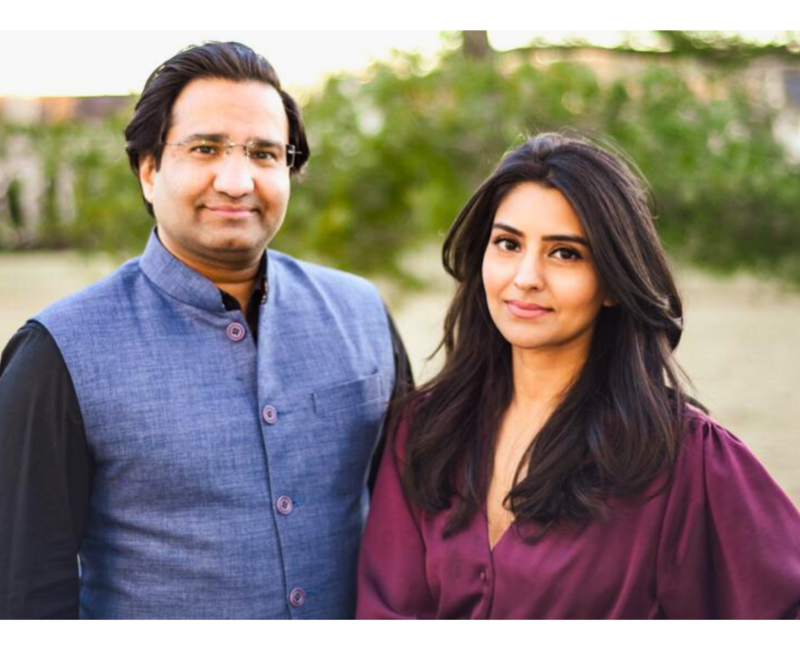
Viral Modi and Avani Modi Sarkar, the co-founders of Modi Toys
Born in India, raised in the US, and rooted in both
Avani was only eight when she moved to the US in 1992 with her family, including Viral who’s now my co-founder at Modi Toys. “My parents did a great job of remaining mindful of where we came from and what we left behind. Growing up, I always felt a deep appreciation for my heritage because of the food we ate, the language we spoke, and the traditions we carried,” says Avani, who settled in New Jersey – a state known for its diversity.
Growing up in the US, the dual identity became Avani’s strength. “I could navigate American culture while staying deeply connected to my Indian roots. I could live in both worlds simultaneously,” she says, adding, “We never really felt like we had left home. We spoke our mother tongue at home, ate homemade ethnic food, and watched Indian movies on TV. It taught me to see the value in bringing different perspectives together, which eventually became the foundation for Modi Toys years later.”
From B2B boardrooms to building a brand with heart
But as a young girl in the 2000s, the dream of becoming an entrepreneur was still far-fetched. So like many, she joined the corporate world after finishing her bachelor’s degree in marketing and later an MBA. For 15 years, she steered through the world of B2B marketing before pivoting to entrepreneurship. What began as a side hustle in 2018 soon turned into a full-fledged business during pandemic. “After losing my job during the pandemic, I was at crossroads and decided to quit Corporate America and focus on Modi Toys full time. My brother had already made the leap a year earlier,” reveals Avani.
When parenthood met purpose, Modi Toys was born
The entrepreneurial dream was born from a deeply personal experience for Avani and Viral – parenthood. Just weeks away from becoming first-time parents in 2017, the siblings found their inspiration for starting Modi Toys. “We were both navigating our changing roles and found ourselves asking questions like, “How are we going to raise our kids with the same sense of connection and core values tied to the Indian culture, as we did growing up?”
With fatherhood imminent, Viral wanted a special gift for his daughter – which was not an heirloom or engraved jewelry, but something she could enjoy from the time she was born. But after returning empty-handed from yet another failed shopping trip, he realised “there aren’t any plush toys which are both fun and cultural.” “As first-generation NRIs raising our children in America, we discovered something critical was missing – toys that reflected our Hindu heritage and roots,” says Avani.
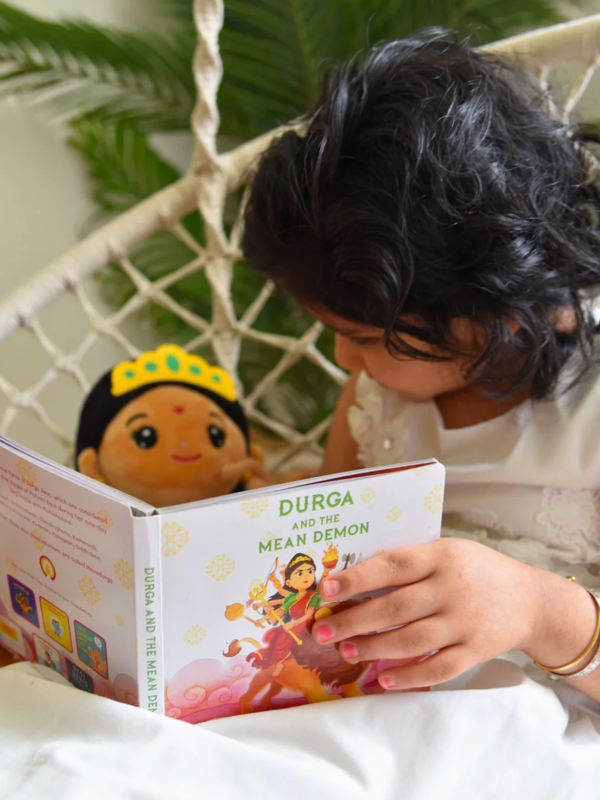
Avani and Viral watched their identities shift from “Indian” to “Indian American” when their daughter and niece were born. “I quickly realised that they weren’t going to grow up the same way. The most glaring gap was in toys and learning materials,” she adds. Festivals and Sunday schools covered the big celebrations, but nothing age-appropriate introduced infants to Indian culture and heritage. “A quick search down the toy aisle proved that the U.S. toy market was severely lacking in cultural representation. Although the global toy market was growing, there were not any toys that reflected diversity in faith.” This shaped their vision for Modi Toys. “We wanted to create products that would serve as cultural connectors between generations. We envisioned toys and books that would spark curiosity about Hinduism in a way that was approachable, fun, and meaningful for children growing up in America.”
Not just toys—tools for cultural connection
Just as the idea for Hindu cultural plush toys was born, so was Viral’s daughter and Avani’s niece. “Our daughters, born just one week apart, quickly became the “Chief Inspiration Officers” of our company. We realised that toys are the gateway to children’s hearts and minds, and that’s how our first product – a mantra-singing plush toy named Baby Ganesh – was created,” she says.
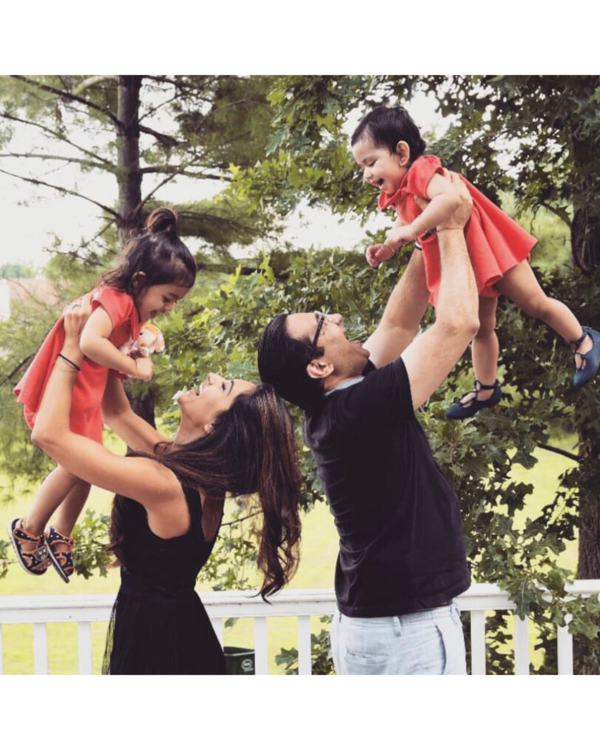
For the last few years, Modi Toys has been making toys that are deeply rooted in South Asian culture and Hindu faith, sparking a curiosity in Indian-American children about their heritage. “Balancing cultural authenticity with playfulness is central to our design philosophy. For us, it’s about creating something that’s both reverent and relatable,” says Avani, whose brand created singing toys. “In Hindu culture, mantras are similar to nursery rhymes. When our kids were born, Viral and I would regularly hear our mom singing mantras to her grandkids, in lieu of singing American nursery rhymes like ‘Twinkle Twinkle Little Star.’ Moments like these were the catalyst for creating a singing toy.”
Cultural roots, global reach: the universal appeal of Modi Toys
In a short span, Modi Toys has already made inroads in 39 countries, reaching out to over 55000 families. “I believe the universal appeal of our toys lies in meeting a deep, shared desire among Indian parents living abroad: the wish to raise children deeply connected to their Indian roots. Every diaspora parent feels that pull to pass on their heritage. It’s not about where you live—it’s about what lives within you that shapes how you raise your child,” says Avani, adding, “The toys serve multiple purposes — they’re educational, comforting, and conversation starters about religious identity. They give parents a natural way to introduce our Hindu gods and goddesses (including what they represent and their stories) through play, which is why they’ve found homes across continents and generations.”
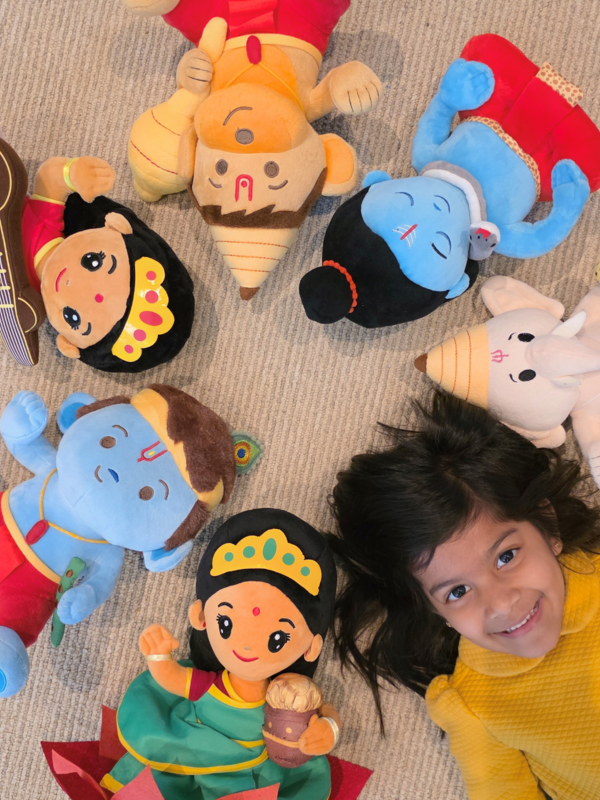
Even celebrities like Mindy Kaling, Priyanka Chopra Jonas and the Ambani family have embraced the toys validating the need for cultural toys. “Recognition from these influential South Asian voices is particularly meaningful because it amplifies our mission of cultural representation. When celebrities with global platforms choose our toys, it helps normalise culturally diverse play materials for all children.”
Respecting faith, navigating fears—one challenge at a time
But it hasn’t been an easy journey as balancing the cultural and spiritual significance of products with their commercial appeal was a challenge for the co-founders. “We’re creating products that represent Hindu deities, which comes with a responsibility to be respectful while also making them accessible and appealing to children. At first, we feared pushback from conservative Hindus uneasy with playful deity representations. Some still hesitate, worried kids might treat the toys inappropriately. But we see these moments as chances to teach respect, helping parents instill deeper cultural values through everyday interactions.”
From New Jersey to Noida—a return rooted in purpose
Nearly five years after successfully launching in the USA, Avani and Viral entered the Indian market to introduce Modi Toys to India – the country that inspired their entrepreneurial journey. “There was a sense of homecoming—bringing a business inspired by our Indian heritage back to the country where our story began,” says Avani, who finds it ironic that her parents moved to the US for a better future and now her brother Viral returned to India to scale the business and build a secure future for his family. “Our parents crossed oceans for the land of opportunity, and now that opportunity was leading us back to our roots. This journey — from immigrant children adapting to a new country to entrepreneurs bringing something meaningful back to our birthplace — reinforced that our business isn’t just about selling toys; it’s about creating cultural bridges between countries, generations, and traditions.”
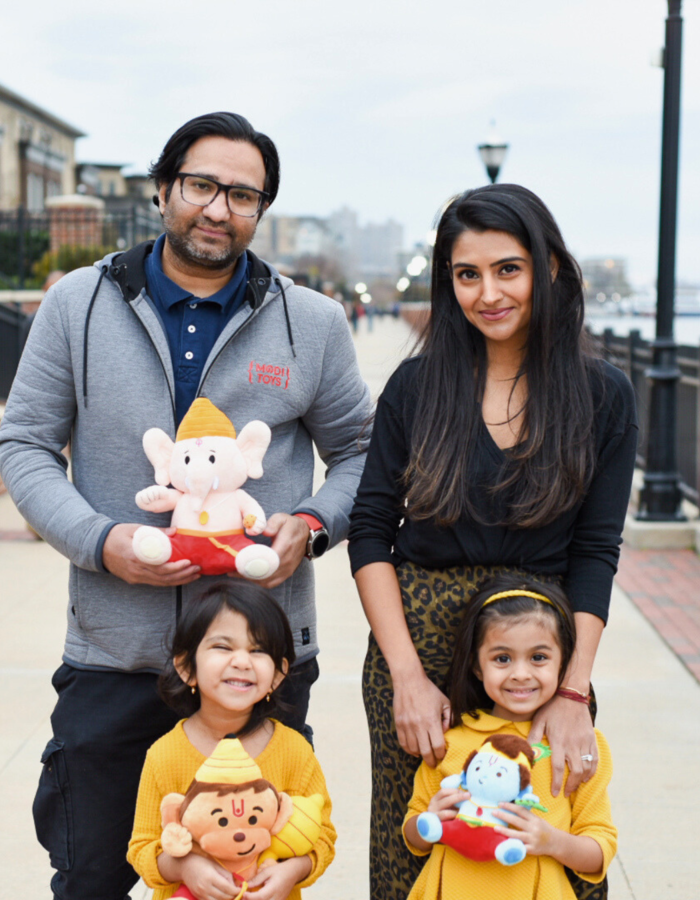
With their new office in Noida, they shifted their manufacturing from China to India in 2021. “It felt like a right move since our brand is based on the concept of preserving our South Asian culture and heritage.” Much like their identities, the company too has a dual presence now – India and the US. “While my Dad and I continue to manage our US operations and focus on marketing and branding from New Jersey, Viral oversees production and our growing presence in India.”
On being Global Indian
For Avani, being a Global Indian means carrying India in her heart, “no matter where I live, and drawing strength from that cultural foundation. Personally, it means I don’t have to choose between my dual Indian and American identities.”
She says that even their approach at Modi Toys embodies Global Indian mindset. “We maintain authentic cultural elements while presenting them in accessible, modern formats. We honour traditions while innovating for today’s families. And we recognise that in our interconnected world, cultural heritage isn’t limited by geography—it travels with people,” she adds.
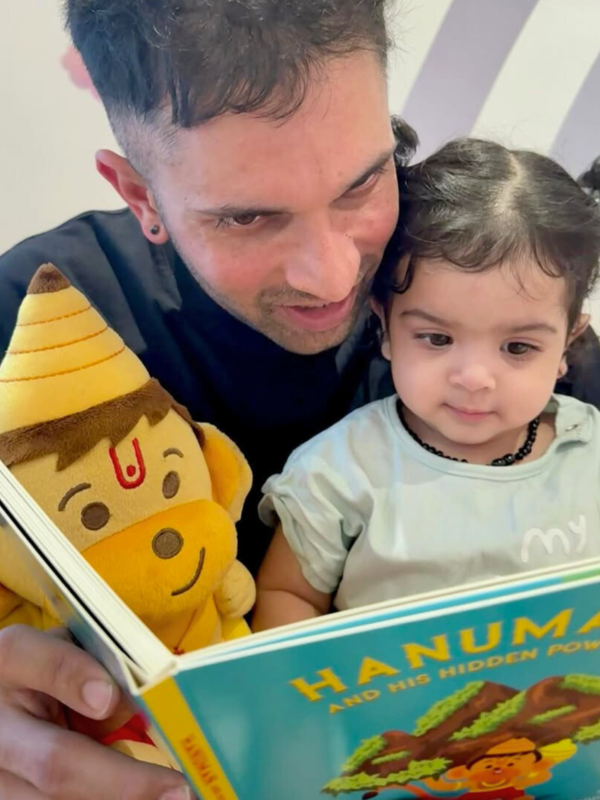
Ready for a diverse and sustainable toy future
With the global toy market evolving towards diversity, sustainability and educational value, Avani believes that “Modi Toys is already positioned to thrive.” “Major toy manufacturers are finally recognising this shift – Mattel’s Barbie line includes dolls representing different ethnicities, body types, and abilities; American Girl introduced their first South Asian ‘Girl of the Year’ doll in 2023 and LEGO features inclusive sets with diverse characters and cultures.” Moreover, with sustainability become non-negotiable, Modi Toys takes pride in crafting toys from recycled plastic bottles. “Each plush toy prevents up to 15 bottles from ending up as environmental waste.”
As Modi Toys continues to find a place in homes around the world, its heart remains rooted in something timeless: identity, intention, and impact. What started as a search for a meaningful gift evolved into a brand that’s redefining how traditions are passed on. Modi Toys is more than a business. It’s a reminder that innovation doesn’t always mean inventing something new — it often means reimagining what’s always been there, in a form the next generation can hold close.
Also Read: Blueprint for Belonging: How Shamila Gopalan is empowering women of colour in Melbourne
Also Read: From Amritsar to Harrods: Akshat Jain’s 100Hands puts Indian craftsmanship on the world’s luxury map
